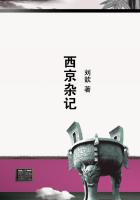Harriet Holden had accompanied her friend to the police station, and was sitting close beside her during the examination, her eyes almost constantly upon the face of the prisoner. She saw no fear there, only an expression of deep-seated sorrow for her friend.
The lieutenant was still asking questions when there came a knock at the door, which was immediately opened, revealing O'Donnell with a young woman, whom he brought inside.
"I guess we're getting to the bottom of it," announced the sergeant.
"Look who I found workin' over there as Compton's stenographer."
"Well, who is she?" demanded the lieutenant.
"A jane who used to hang out at Feinheimer's. She has been runnin' around with this bird. They tell me over there that Compton hired her on this fellow's recommendation. Get hold of the Lizard now, and you'll have the whole bunch."
Thus did Sergeant Patrick O'Donnell solve the entire mystery with Sherlockian ease and despatch.
At Jimmy's preliminary hearing he was held to the grand jury, and on the strength of the circumstantial evidence against him that body voted a true bill. Edith Hudson, against whom there was no evidence of any nature, was held as a witness for the State, and a net was thrown out for the Lizard which dragged in nearly every pickpocket in town except the man they sought.
Jimmy had been in jail for about a week when he received a visitor. A turnkey brought her to his cell. It was Harriet Holden. She greeted him seriously but pleasantly, and then she asked the turnkey if she might go inside.
"It's against the rules, miss," he said "but I guess it will be all right." He recalled that the sheriff had said that the girl's father was a friend of his, and so assumed that it would be safe to relax the rules in her behalf. He had been too long an employee of the county not to know that rules are often elastic to the proper pressure.
"I have been wanting to talk to you," said the girl to Jimmy, "ever since this terrible thing happened. Somehow I can not believe that you are guilty, and there must be some way in which you can prove your innocence."
"I have been trying to think out how I might," said Jimmy," but the more I think about it the more damning the circumstantial evidence against me appears."
"There must always be a motive for a crime like that," said Harriet. "I cannot believe that a ****** fear of his discharge would be sufficient motive for any man to kill his employer."
"Not to kill a man who had been as good to me as Mr. Compton was," said Jimmy, "or a man whom I admired so much as I did him. As a matter of fact, he was not going to discharge me, Miss Holden, and I had an opportunity there for a very successful future; but now that he is dead there is no one who could verify such a statement on my part."
"Who could there be, then, who might wish to kill him, and what could the motive be?"
"I can only think," said Jimmy, "of one man; and even in his case the idea is too horrible--too preposterous to be entertained."
Harriet Holden looked up at him quickly, a sudden light in her eyes, and an expression of almost horrified incredulity upon her face. "You don't mean--" she started.
"I wouldn't even use his name in connection with the thought," Jimmy interrupted; "but he is the only man of whom I know who could have profited by Mr. Compton's death, and, on the other hand, whose entire future would have been blasted possibly had Mr. Compton lived until the following morning."
The girl remained for half an hour longer, and when she left she went directly to the home of Elizabeth Compton.
"I told you, Elizabeth," she said, "that I was going to see Mr. Torrance. You dissuaded me for some time, but I finally went today, and I am glad that I went. No one except yourself could have loved your father more than I, or have been more horrified or grieved at his death; but that is no reason why you should aid in the punishment of an innocent man, as I am confident that this man Torrance is, and I tell you Elizabeth if you were not prejudiced you would agree with me.
"I have talked with Torrance for over half an hour to-day, and since then nothing can ever make me believe that that man could commit a cold-blooded murder. Harold has always hated him--you admit that yourself--and now you are permitting him to prejudice you against the man purely on the strength of that dislike. I am going to help him. I'm going to do it, not only to obtain justice for him, but to assist in detecting and punishing the true murderer."
"I don't see, Harriet, how you can take any interest in such a creature," said Elizabeth. "You know from the circumstances under which we saw him before father employed him what type of man he is, and it was further exemplified by the evidence of his relationship with that common woman of the streets."
"He told me about her to-day," replied Harriet. "He had only known her very casually, but she helped him once--loaned him some money when he needed it---and when he found that she had been a stenographer and wanted to give up the life she had been leading and be straight again, he helped her.
"I asked Sergeant O'Donnell particularly about that, and even he had to admit that there was no evidence whatever to implicate the girl or show that the relations between her and Mr. Torrance had been anything that was not right; and you know yourself how anxious O'Donnell has been to dig up evidence of any kind derogatory to either of them."
"How are you going to help him?" asked Elizabeth. "Take flowers and cake to him in jail?"
There was a sneer on her face and on her lips. "If he cares for flowers and cakes," replied Harriet, "I probably shall; but I have another plan which will probably be more practical."















